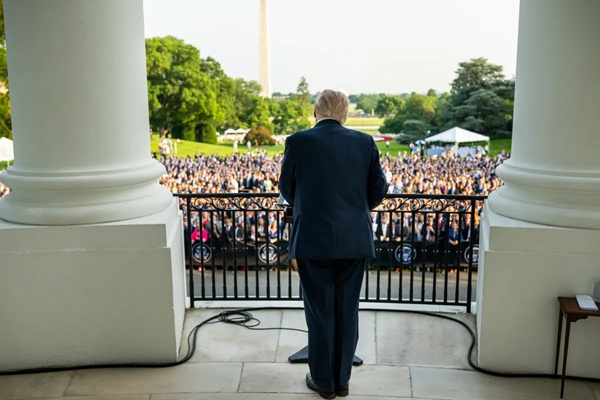.png)
India Must Not Be the Next Casualty of Trump’s Phone-Based Deals
To avoid misrepresentation, as was the case with the US deals with Jakarta and Hanoi, India must insist on a jointly issued, written statement before acknowledging any agreement.

July 19, 2025 at 11:46 AM IST
United States President Donald Trump has announced trade agreements with Vietnam and Indonesia, claiming sweeping gains, including zero tariffs on exports, massive purchase commitments, and sharply higher tariffs on goods entering the US from both countries.
A closer look shows a troubling pattern: Trump finalised both deals through private phone calls with Vietnam’s top leader Tô Lâm and Indonesia’s President Prabowo, pushing them for more than what their official negotiators had agreed to.
This led to discrepancies between what the countries say they agreed to, and what Trump claims they promised.
Indonesia’s “Struggle”
Trump’s Indonesia deal is mired in uncertainty because it was sealed not by Jakarta’s trade negotiators but in a private phone call between President Donald Trump and Indonesian President Prabowo Subianto.
Announced on Truth Social on July 15, 2025, Trump boasted that US exports would pay zero duty while Indonesian goods would face a 19 % tariff, down from the 32 % he imposed in April, and that Jakarta would purchase $15 billion in US energy, $4.5 billion in farm products, and 50 Boeing jets, including several 777s.
Although Prabowo’s office later hailed the talks as an “extraordinary struggle,” officials admitted “the agreement was concluded over the phone,” bypassing the mandate-holding negotiating team.
With no publicly released text and growing whispers in Jakarta that many of Trump’s terms were never formally accepted, the gap between presidential claims and documented commitments has cast serious doubt on whether a binding US–Indonesia trade pact actually exists.
Vietnam Dispute
Trump’s handling of the Vietnam trade deal has raised serious doubts about its credibility.
On July 2, 2025, he announced on Truth Social that a deal had been reached under which Vietnamese exports to the US would face a 20% tariff, while US exports to Vietnam would enter duty-free.
However, Vietnamese officials quickly pushed back, stating they had only agreed to an 11% tariff, exposing a major gap between what Trump claimed and what was actually negotiated.
The deal, finalised via a private phone call between Trump and Vietnam’s General Secretary Tô Lâm, remains just a framework, not a binding agreement. No joint statement or official text has been released, and the Vietnamese side has not confirmed Trump’s tariff claims.
Even Trump admitted on July 15 that the agreement was still “nearly complete,” despite already announcing it two weeks earlier.
This lack of written confirmation and conflicting claims have created confusion around the deal—mirroring similar unease in Indonesia, where internal dissent is also emerging over the terms Trump unilaterally declared.
Lessons for India
Trump has said India is “working along the same line” as Indonesia.
This suggests similar approach may be followed: Indian negotiators may agree to “A-level” concessions, such as modest tariff hikes, but Trump after a phone call with Prime Minister Modi publicly announces “A++” outcomes—duty-free access for US goods, sharp tariff hikes for foreign imports, and billion-dollar purchase commitments—without formal documentation.
If this happens India risks being locked into a highly asymmetric deal based on verbal promises, not verifiable texts.
India must proceed with extreme caution in negotiating any trade deal with the United States, given Trump administration’s current approach.
To avoid similar misrepresentation, India must insist on a jointly issued, written statement before acknowledging any agreement.
A bad deal, especially one that removes India’s tariffs without reciprocal benefits, could be worse than no deal at all.
India must therefore negotiate transparently, guard against one-sided outcomes, and not succumb to pressure for MASALA deal that compromise long-term economic interests.




